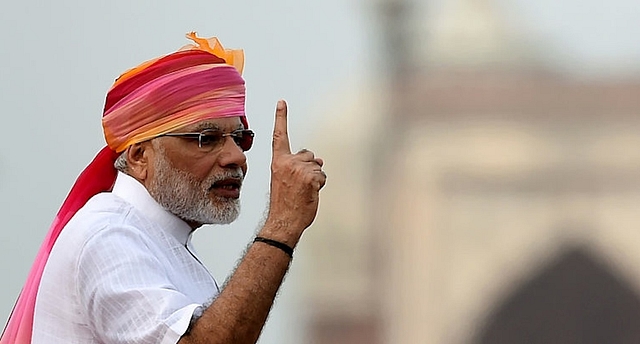
Monkey With A Machine-Gun: Why Modi Should Let Pak Drown In Its Own Bile
By experience, it can be safely concluded that Pakistan only seems to understand the language of force, belligerence, aggression, and threats.
Congress leaders would do well to remember that Indira Gandhi had adopted the same approach in 1971 as PM Modi does today.
What until a few years ago used to be called received wisdom is
now called the ‘dominant narrative’. It is difficult to tell where such
nomenclatural fashions come from, or why, but they make those who use them
sound contemporary. That does not mean what they are saying is contemporary,
however. In fact, more often than not, it is old hat, just a recycling of,
well, received wisdom.
In India, for nearly 70 long years the ‘dominant narrative’ has been the Gandhian notion that India must be nice to everyone, you know, that ‘turn the other cheek’ thing. This ‘get-slapped-repeatedly’ philosophy was presented by semi-educated liberals as being the only truly Indian one. The properly educated ones had a different view.
The Noughties, under the vapid leadership of Sonia Gandhi and Manmohan Singh, took this idea further. India became a weepy-teary country where the defence of wimpish conduct, albeit in well-crafted phrases, became the norm. After all, for the Sonia-Singh duo, as long as the words were right action could be forsworn.
Pakistan took full advantage of this and has been running circles around us.
By some extraordinary osmosis and transmission Narendra Modi, a toughie if there was one, also adopted this approach between May 2014 and August 2016. He sounded exactly like the wimps of yore.
But on August 15 this year, however, he decided to dump that pretence and spoke the only language Pakistan understands -- of force, belligerence, aggression, and threats. Congress wimps made some inane noises, forgetting that their Great Leader, Indira Gandhi, had done exactly the same thing in 1971. In fact, she had taken it further and broken Pakistan into two.
Modi is now asking—a la Mrs Gandhi Sr—if the time has come for another kick in the Pakistani shalwars? Most Indians would say yes. Even if they do not say it, most foreigners would agree, I suspect. Judging by Pakistan’s shrill statements on 16 August, Modi’s remarks seem to have hit home. It is making an ass of itself – as usual – over Kashmir.
In India meanwhile, the ‘dominant liberal narrative’ being propagated today about J&K is that the ‘Kashmiris’ do not wish to be a part of India. Really? All 12.5 million of them across the Valley, Jammu and Ladakh? Or just a few thousands in the Valley which measures 80X40 miles?
The liberals forget that the Muslims of the Valley have had different beliefs. The National Conference had been opposed by the Muslim League elements from pre-Partition times. Remember ‘Sher’ and ‘Bakra’, the division between Sheikh Abdullah’s supporters and his opponents? The Valley’s Muslims were not united against joining India in 1947. They are not now. How many Bakerwaal and Gujjar Muslims of J&K support the few Sunnis who want out?
Remember, too, that different parts of India have seen continuing violence in pursuit of diverse ‘azaadi’ agendas without breaking up the country. The last such call was by CN Annadurai in the early 1960s, but when did Tamil Nadu last ask for the right of ‘self-determination’? Millions have left India for a variety of reasons, even as the land that is India survives. So why does the demand for ‘azaadi’ by a few in the Valley get conflated to a compulsion for India to capitulate?
Pakistan, the same narrative has it, echoing Nawaz Sharief’s expression after his country conducted nuclear tests in May 1998, has become ‘mahfooz’, or safe. It also has China in its corner. But they forget that in 1971 it had the US, which couldn’t save it.
Anyway, who is talking of war? It’s mostly a psychological thing and, with the Pakistanis, it pays to not just be tough but sound it too.
For the most part, since 1958, that country has been run by short-sighted dictators – Ayub Khan, Yahya Khan, Zia ul-Haq, Pervez Musharraf. All were army chiefs. All had and have a vested interest in confrontation with India.
But the truth is that the Pakistani army is yet to win a war – not even against its own people, as the Baloch and the Pathans have demonstrated. The Pakistani economy is constantly on life-support. Its political parties are at the mercy of the Army. Its society is at the mercy of terrorists. To borrow Soorma Bhopali’s inimitable turn of phrase in ‘Sholay’, “Aapke to warrant pehle hi nikle hue hain, hamaari kya zaroorat hai”?
Pakistan has nuclear weapons; it also has a Himalayan chip on its shoulder from its million failures. But it is in fact no match for India. Its self-destructive policies are the best proof of that.
So the real question before India is how to deal with a monkey that has picked up a machine gun and is demanding parity because it has that machine gun. The answer, frankly, is not to deal with it.
Nor need India have any fear of a country whose idea of international relations is to export terrorism and beg for money.
People who advocate engagement also say that we don’t know who to talk to! But the guys you can talk to don’t have the power and the guys who have the power don’t want to talk. What a joke of a country! Have no doubts about it, it is a failed state. We should let it drown in its own bile.
It deserves no less from us.